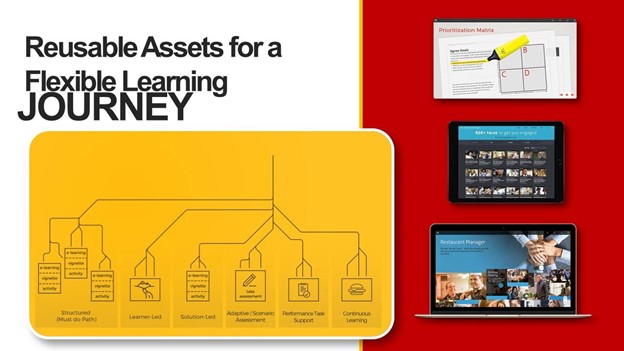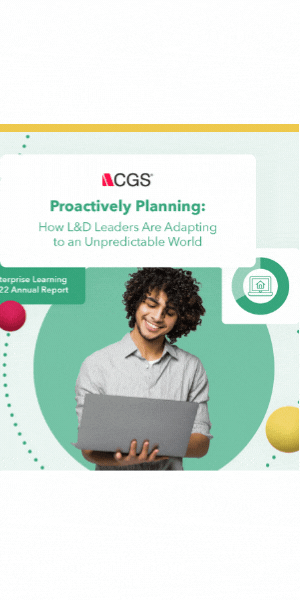Topics
Forecasting 2021 Requires Digital Transformation and External Partnerships in L&D

Two Cases Studies on Lessons Learned from McDonalds and Toshiba Global Commerce Solutions
Learning and development changes made amid the coronavirus pandemic this year are leading companies’ digital transformations as they head into 2021. In a recent discussion hosted by the Human Capital Institute (HCI), McDonald’s and Toshiba Global Commerce Solutions (TGCS) walked through how they leveraged essential vendor partnerships to create customized content that delivered incredible ROI and promises to continue doing so in the long-term. Watch the complete webinar now.
.Customized Content
Gartner defines personalization as “a process that creates a relevant, individualized interaction between two parties designed to enhance the experience of the recipient.” According to a post on Gartner’s web site, “3 Ways Personalization can Improve the Employee Experience,” “personalization will revolutionize L&D by providing customized learning experiences for every employee, based on the challenges they face in their role, their career aspirations and their personal preferences.” Understanding trends in personalization, or customization, can help your organization decide your best path forward in 2021.
The Teamwork AR app created by CGS delivered an immersive training experience for TCGS technicians who couldn’t be there in person to learn. In fact, TCGS were early adopters of augmented reality, so their usage preceded and will long outlast this pandemic. One example of content they are building training around is video capture; live repair processes are integrated into their courses. Their Explain-Show-Practice frameworks allow for learners to have text-based instruction, demonstrations, and virtual hands-on experiences in AR.
Likewise, McDonald’s found value in recording their subject matter experts rather than sending them around to various locations. An adaptation to travel restrictions due to coronavirus proved to have a huge ROI for Hamburger U, as did curating prepackaged content so that standard subjects like wellness could be integrated into McDonald’s curricula in customized ways.

ROI
Speaking of ROI, you might be daunted by the investment required to “go digital” and therefore continue to play it safe by creating content in-house the way you’ve always done it. In fact, in a poll during the webinar, 76% of your peers said that they were spending an average of 44% of their time redesigning or rethinking learning programs due to COVID-19. And most participants said they have adapted to covid by creating online materials or offering self-paced learning options, by far the least change of all digital options we have. No one besides the panelists had yet taken the plunge into experiential content, despite the geographic restrictions we are all facing and have been facing for quite some time now.
The speakers highlighted a few ways that going digital is paying off. For McDonald’s, the long-term usability of content created as they pivoted from instructor-led to VILT will have a higher payoff, especially since they approached digital with a long term mindset. The training on social distancing had to get out very quickly, and it was changing often. The good news is that once it was created it could be used in different ways, such as when stores were reopening and when new employees were hired.
For TGCS, the Teamwork AR app itself allows for better calculation of ROI by offering data comparison between operations and learning. The business can see detailed status of training - when students access it, how much time they spend on it, and when the operators compare this information with improvements they’re seeing, the correlations show the value.
Digital and nimble
The data available through digital learning channels also creates a continuous feedback loop--generating insights about what needs to be changed for learners in this new “classroom” environment but also what needs to be changed on the job. The integration is more seamless and allows for changes to happen faster. McDonald’s is able to update a piece of their training and test the impact through a minimum viable product without affecting entire learning programs. In this way, the feedback loop becomes embedded in the design process rather than through a survey or external measurement technique, which is much more efficient than many of us are used to. And it requires a new way of thinking - a nimble approach that most businesses are working to adopt so as not to be left behind in 2021, pandemic or no.
As companies become more agile on the whole, more interested in feedback and more able to adapt, learning and development teams at their best can lead the way. At a minimum, L&D departments and leaders must be able to meet the demands of challenges that arise, whether pandemics or other unpredictable obstacles their enterprises face. Why not take the long view like McDonald’s, proactively figure out how agile learning programs, partners and new technologies can work for you, like TGCS, and find that unique approach that only digital can offer?
Watch the full webinar.
RESOURCES
https://www.cgsinc.com/en/resources/learning-technology-consulting-solutions-case-study
https://www.cgsinc.com/en/resources/case-study-toshiba-global-commerce-solutions-tcgs-uses-ar

